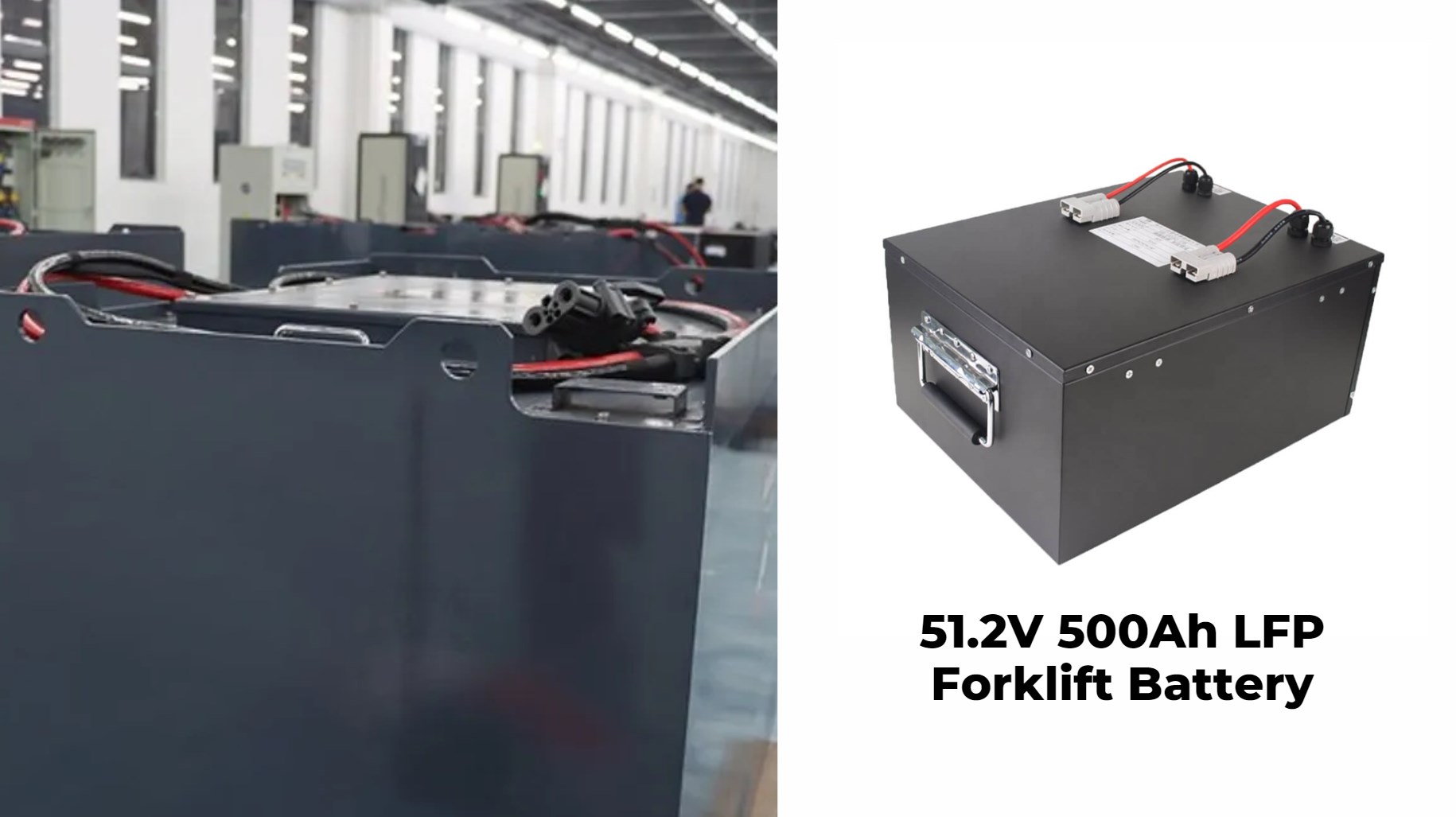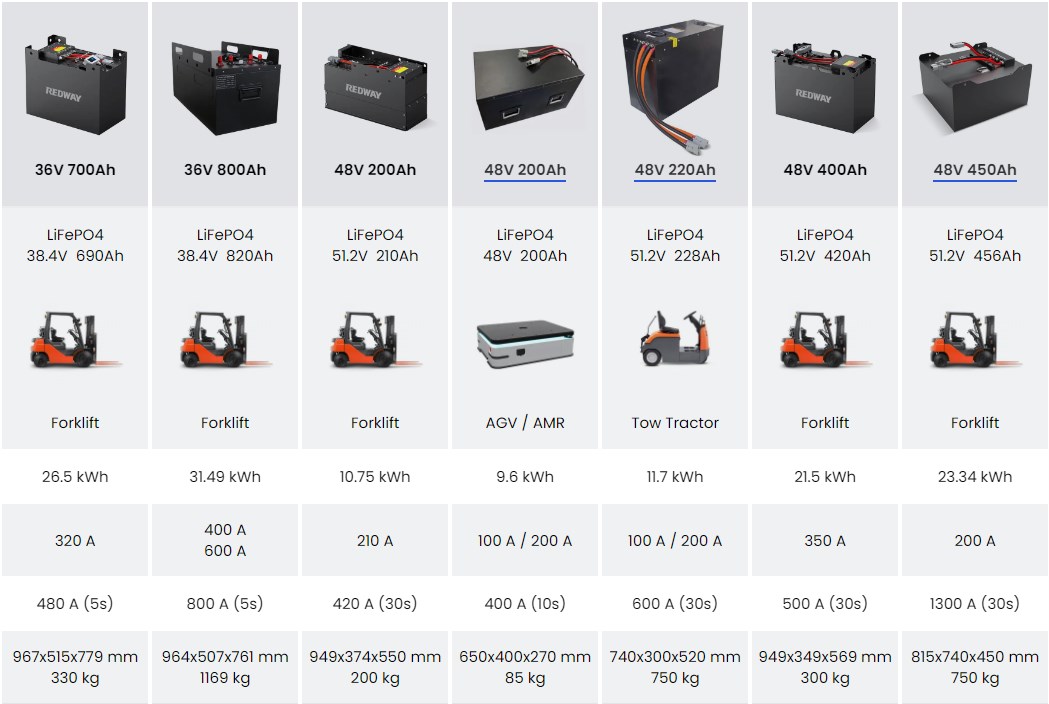In the world of material handling, forklift batteries play a crucial role in ensuring operational efficiency and productivity. Understanding the different types of forklift batteries available is essential for businesses seeking the best power solutions for their equipment. At Redway Battery, we specialize in manufacturing Lithium LiFePO4 batteries, particularly in high voltage applications, and we are here to guide you through the various types of forklift batteries on the market today.
The different types of forklift batteries include:
- Lead-Acid Batteries—traditional choice with lower upfront costs but more maintenance,
- Lithium-Ion Batteries—popular due to longer lifespan and faster charging,
- Nickel-Cadmium (NiCd) Batteries—suitable for high discharge rates,
- Gel Cell Batteries—a safer type of lead-acid with gelled electrolyte but generally less powerful!
1. Lead-Acid Batteries
Overview
Lead-acid batteries have been the traditional choice for forklifts for many years. Known for their reliability and cost-effectiveness, these batteries are widely used in various applications.
Types of Lead-Acid Batteries
- Flooded Lead-Acid Batteries: These batteries require regular maintenance, including water topping and equalization charging. They are generally less expensive upfront but can incur higher long-term costs due to maintenance needs.
- Absorbent Glass Mat (AGM) Batteries: AGM batteries are sealed and require no maintenance. They offer better performance in terms of discharge rates and depth of discharge but come at a higher price point.
- Gel Batteries: Similar to AGM, gel batteries are sealed and maintenance-free. They are particularly suited for applications in extreme temperatures, providing a stable performance without the risk of spillage.
Pros and Cons
- Pros:
- Lower initial cost
- Established technology
- Wide availability
- Cons:
- Requires regular maintenance (especially flooded types)
- Shorter lifespan compared to lithium batteries
2. Lithium-ion Batteries
Overview
Lithium-ion batteries have gained popularity in recent years due to their advanced technology and performance benefits. At Redway Battery, we focus on Lithium LiFePO4 batteries, a specific type of lithium battery known for its safety and longevity.
Advantages of Lithium LiFePO4 Batteries
- Long Cycle Life: Lithium LiFePO4 batteries typically offer over 3000 cycles, significantly outlasting traditional lead-acid batteries.
- Faster Charging: These batteries can be charged more quickly, often within 1-2 hours, leading to reduced downtime.
- Maintenance-Free: Lithium batteries require no watering or equalization, making them easier to manage.
- Consistent Performance: They provide stable power output throughout their discharge cycle, ensuring your forklift operates efficiently.
Applications
Lithium LiFePO4 batteries are ideal for electric forklifts used in warehouses, distribution centers, and manufacturing facilities, where uptime and reliability are paramount.
Pros and Cons
- Pros:
- Longer lifespan and higher efficiency
- Faster charging times
- Lightweight compared to lead-acid
- Cons:
- Higher initial investment
- Requires a compatible charger
3. Nickel-Cadmium (NiCd) Batteries
Overview
Nickel-cadmium (NiCd) batteries are another option for forklift power, although they are less common than lead-acid and lithium batteries.
Features of NiCd Batteries
- Durability: These batteries are known for their robust construction and can withstand extreme conditions.
- Rapid Discharge Rates: NiCd batteries perform well under high discharge rates, making them suitable for heavy-duty applications.
Advantages and Disadvantages
- Pros:
- Excellent performance in cold temperatures
- Longer lifespan compared to lead-acid batteries
- Cons:
- Memory effect can reduce usable capacity
- Environmental concerns regarding cadmium disposal
4. Sodium-Nickel Chloride (NaNiCl) Batteries
Overview
Sodium-nickel chloride (NaNiCl) batteries, also known as Zebra batteries, are emerging as an innovative alternative in the forklift battery market.
Key Features
- High Energy Density: These batteries provide a high energy output, making them suitable for larger forklifts and heavy-duty applications.
- Wide Temperature Range: NaNiCl batteries can operate efficiently in extreme temperatures, making them versatile for different working environments.
Pros and Cons
- Pros:
- Long cycle life
- Good performance at high temperatures
- Cons:
- Less common and more expensive than other battery types
- Requires careful handling due to the high operating temperatures
5. Comparing Forklift Battery Types
| Battery Type | Lifespan (Cycles) | Charging Time | Maintenance | Cost |
|---|---|---|---|---|
| Lead-Acid | 500-2000 | 8-12 hours | Regular maintenance | Low initial cost |
| Lithium LiFePO4 | 3000-5000 | 1-2 hours | Maintenance-free | Higher initial cost |
| Nickel-Cadmium (NiCd) | 1500-2500 | 1-3 hours | Minimal | Moderate cost |
| Sodium-Nickel Chloride | 2000-4000 | 3-5 hours | Minimal | Higher cost |
Conclusion
Choosing the right type of forklift battery is essential for optimizing performance and ensuring cost-effectiveness in your operations. Each battery type has its unique benefits and drawbacks, and the best choice will depend on your specific needs and working conditions.
At Redway Battery, we provide high-quality Lithium LiFePO4 batteries that offer outstanding performance and longevity, perfect for modern forklift applications. With over 12 years of experience in battery manufacturing, we are committed to delivering reliable and efficient power solutions to wholesale and OEM customers worldwide. Contact us today for a quick quote and discover how our battery solutions can enhance your operations.
Latest News
- The main types of forklift batteries include lead-acid (flooded and sealed), lithium-ion, gel cell, and AGM (Absorbent Glass Mat).
- Recent studies highlight the growing preference for lithium-ion due to its efficiency and lower maintenance needs compared to traditional lead-acid options.
- Industry trends suggest that businesses are increasingly considering sustainability when choosing battery types.
Redway Expert Comment
“Understanding the different types of forklift batteries is crucial for making informed decisions about energy solutions. Each type has its advantages; however, lithium-ion technology is gaining popularity due to its superior efficiency and lower maintenance requirements. As sustainability becomes a priority across industries, selecting the right battery type will play a pivotal role in optimizing operations.”
FAQ
Lead-acid batteries require regular maintenance, have a shorter lifespan (1,000-1,500 cycles), and are less energy-efficient compared to lithium-ion batteries, which are maintenance-free, last longer (2,000-3,000 cycles), and charge faster. Lithium-ion batteries also provide consistent power until nearly fully discharged, while lead-acid performance declines as they discharge.How does the maintenance requirement of AGM batteries compare to lead-acid batteries?
AGM batteries are maintenance-free and do not require watering, making them easier to manage than traditional flooded lead-acid batteries, which need regular topping off with distilled water and periodic inspections. This reduces operational costs and labor associated with battery upkeep.What are the cost implications of switching from lead-acid to lithium-ion forklift batteries?
Switching to lithium-ion batteries involves a higher upfront cost but can lead to significant long-term savings due to their longer lifespan, reduced maintenance needs, and improved energy efficiency. Businesses may save on replacement costs and downtime associated with traditional lead-acid batteries.How does the performance of AGM batteries under heavy loads compare to lithium-ion batteries?
AGM batteries perform well under moderate loads but can experience voltage drops under heavy loads compared to lithium-ion batteries, which maintain consistent power output even as they discharge. Lithium-ion technology is better suited for high-demand applications requiring sustained energy delivery.What are the safety concerns associated with lithium-ion forklift batteries?
Lithium-ion forklift batteries pose risks such as thermal runaway, which can cause overheating or fires if not properly managed. They also require appropriate charging equipment to prevent overcharging. However, they are generally safer than lead-acid batteries, which can leak acid and emit toxic fumes during charging.





